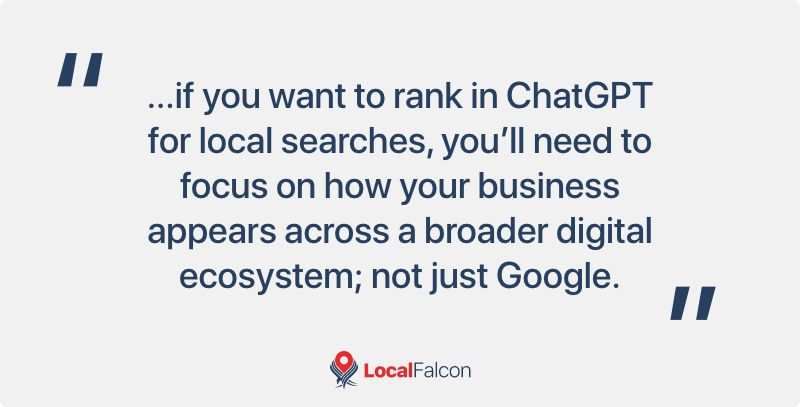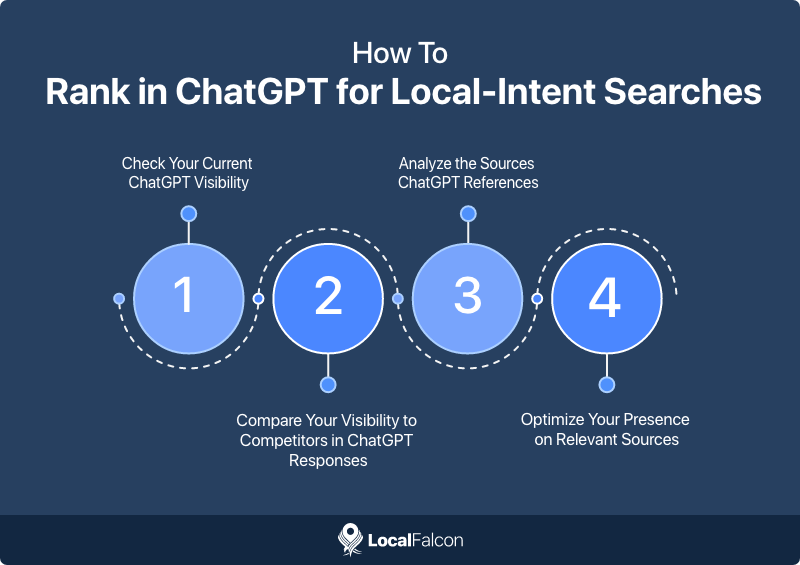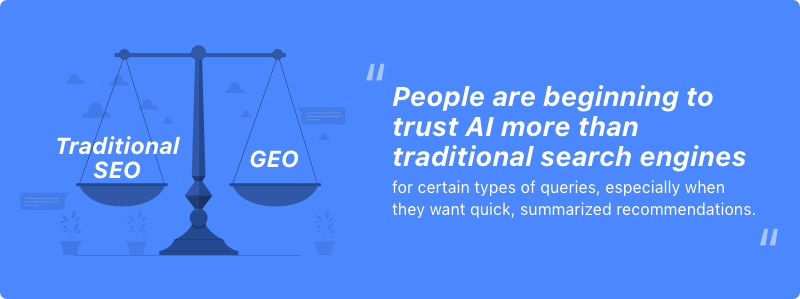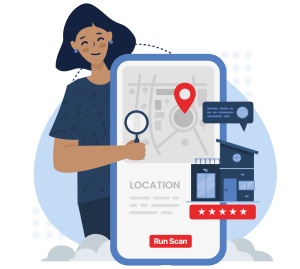Whether you're a local business owner or an SEO professional, you've probably noticed that more and more people are starting to use AI tools like ChatGPT to find local products, services, and information.
Users are increasingly relying on AI-generated responses to summarize decision-making information and help them find local businesses to visit or book an appointment with, and it's changing how local SEO works, especially in terms of where you need to measure your visibility and what metrics you need to track.
Don't get us wrong. Ranking well on Google Maps and appearing in the local pack are still a sort of "Holy Grail" of local SEO, and Google visibility is a major driver of customer engagement (calls, clicks, direction requests) and business, but the definition of local visibility is expanding to include AI visibility. You might even have noticed a drop in your website traffic by now due to the rise of AI-driven local search behavior.
As more of your potential customers are turning to ChatGPT for their local-intent searches, it's important to understand how to rank in ChatGPT search results to ensure you're visible wherever your target audience may potentially be exposed to your brand (or your competitors).

Can Local Businesses "Rank" in ChatGPT?
Before we go on, let us clarify that ChatGPT does not specifically "rank" businesses in the traditional sense, like Google does with Google Business Profile listings or organic blue-link results. Since ChatGPT aims to provide users with helpful information in whatever way makes the most sense for their query, there's no formal ranking algorithm like Google uses, and ChatGPT can display local search results in many different ways. So, when we refer to ranking in ChatGPT, what we mean is what order your business was mentioned in.
Even though ChatGPT sometimes shows a map and a list of local businesses that looks a lot like a local pack, numbered positions and all, it's also possible for a business to be mentioned in a simple bulleted list or a more conversational answer. In this case, ranking in ChatGPT means being among the businesses that the AI model chooses to mention. Of course, you ideally want to be listed first or highlighted as the best option, but with AI being so dynamic, simply being mentioned at all is a win.
The challenge is that ChatGPT's responses are influenced by many different factors that go far beyond Google's local search ecosystem, making the overall strength of your online presence, the consistency of your business information across the web, and the amount of third-party content associated with your brand more important than ever.
In other words, if you want to rank in ChatGPT for local searches, you'll need to focus on how your business appears across a broader digital ecosystem; not just Google. That includes local or industry-specific directories and review platforms, blogs, news outlets, online publications, and anywhere else that AI might pull context from to generate its answers.
So how do you make sure ChatGPT includes your business in its responses to local-intent queries? Let's take a closer look at what you can do to improve your chances of being mentioned in ChatGPT's local search responses.

How To Rank in ChatGPT for Local-Intent Searches
Step 1: Check Your Current ChatGPT Visibility
Before you can improve your ranking in ChatGPT, you need to know where you stand. Local Falcon offers ChatGPT visibility tracking, so you can see exactly where, when, and how your business is being mentioned in ChatGPT local search results.
Just like with our geo-grid rank tracking, you simply select a location and keywords, then choose ChatGPT as your data source to run a scan. The results show a local SEO heat map of where your business (and its competition) appears in AI-generated responses, including visibility scores according to the order it was mentioned in. It's the easiest way to uncover gaps, monitor competitors, and take action to boost your visibility in this new AI-driven local search ecosystem.
Step 2: Compare Your Visibility to Competitors Ranking in ChatGPT Responses
Once you know how often your business is being mentioned by ChatGPT, the next step is to see how you stack up against competitors. Local Falcon's ChatGPT visibility tracking gives you a detailed breakdown of which other businesses are appearing in AI-generated local search responses, whether or not your business is mentioned.
You'll see precise data on the percentage of responses each business is mentioned in, their average position in the list, and their overall Share of AI Voice (SAIV). This helps you quickly identify the top performers in your area and industry, giving you a benchmark to work towards and, often, insight into what strategies are working for them. Comparing your visibility to theirs allows you to pinpoint where you're falling behind and prioritize improvements that will have the most impact.
Step 3: Analyze the Sources ChatGPT References to Understand How To Rank in ChatGPT
Despite the lack of any type of formal local search algorithm, ranking in ChatGPT isn't totally random. Its answers are informed by external data sources. That's why Local Falcon also shows you which third-party sources ChatGPT is referencing when it recommends businesses. These can include business sites, blogs, media publications, forums, directory and review sites, and more.
This level of insight is the key to understanding how to rank in ChatGPT search results. If ChatGPT is consistently pulling information about restaurants from platforms like Yelp, OpenTable, and Time Out magazine, and your business is missing or underrepresented there, that's likely affecting your visibility.
Understanding where ChatGPT is getting its data allows you to essentially reverse-engineer its logic and focus your optimization efforts in the right places.
Step 4: Optimize Your Presence on Relevant Sources To Improve Your ChatGPT Visibility
Once you know which sources ChatGPT is referencing for your business, industry, competitors, and geographic area, it's time to take action and focus on strengthening your presence on those specific sources.
For example, sticking with our restaurant example from above, you might claim your Yelp listing and collect more Yelp reviews as well as update your information on OpenTable and, you guessed it, get more reviews on the platform. It might be a little harder to get featured in a publication like Time Out magazine, but you could always try submitting your business information, details about a special event, or a press release to the editors to try and get some coverage.
While there's no magic formula for ranking in ChatGPT responses, the more frequently and consistently your business appears across trusted sources, the more likely ChatGPT is to surface your brand in local search responses.

Why Should Businesses Care About How To Rank in ChatGPT for Local Searches?
Although Google remains the leading driver of local search traffic, there's no denying that some of that traffic is shifting towards AI platforms like ChatGPT. More users are turning to AI tools to answer their questions and make decisions, including regarding local businesses. As this behavior grows, it's creating new opportunities for visibility, not to mention new risks for local businesses that aren't paying attention.
Trends show that people are beginning to trust AI more than traditional search engines for certain types of queries, especially when they want quick, summarized recommendations. Many users now expect AI to deliver personalized, accurate, and unbiased answers, and they're using those answers to help guide their choices for everything from deciding what restaurant to eat at to choosing a home services business to hire.
Even if AI-generated responses don't always lead to immediate actions like website visits, phone calls, or map directions, they still play a critical role in building local brand recognition. When ChatGPT mentions your business in its responses, it often puts your brand in front of potential customers during the discovery and consideration phase, and that exposure sticks, especially since ChatGPT stores conversations so customers can easily refer back to them later. Later, when those customers are ready to make a decision, they're more likely to remember and choose a business they've already seen mentioned across AI-generated results.
Conclusion
As AI tools like ChatGPT increasingly influence how people discover local businesses, it's essential to start thinking beyond traditional search rankings. While Google is still the main driver of local search traffic, your business's visibility in AI-generated responses is becoming just as important for staying competitive.
Monitoring your ChatGPT visibility, analyzing competitors, understanding which sources AI tools rely on, and strengthening your presence across those platforms, helps improve your chances of being mentioned in ChatGPT and other AI-powered search channels. Ultimately, this boosts your overall local search performance and drives more business on the ground.


